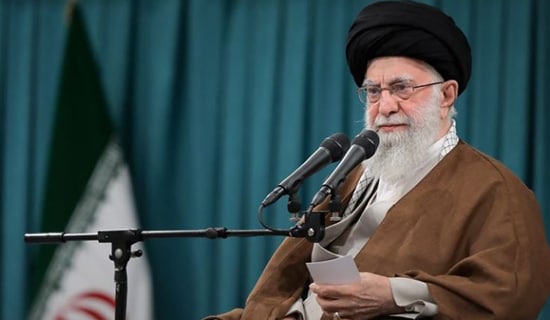On February 27 and 28, 2010, a Kuwaiti folk group headed by singer Ema Shah, which performs songs and dances from around the world, gave two concerts at the Kuwait University Alumni Club. In addition to songs in Arabic, English, Spanish and Japanese, the program included the Hebrew song "Hava Nagila," as well as some songs by Jewish French singer Enrico Macias. On the first night, the songs were received with warm applause by the audience. However, during the second performance, there was some protest from the audience and demands to remove the songs from the program.
Ema Shah rejected these demands. In an April 6, 2010 interview, she explained that her group performed folk music in order to connect people around the world and remove barriers created by extremists who oppose freedom, liberalism and democracy. She stressed that there was nothing in the song "Hava Nagila" that was offensive to Arabs, that performing a song in a foreign language is not tantamount to spying for a foreign country, and that art should not be mixed with politics. She added that Kuwait, which is not a theocracy, should uphold its laws of freedom of belief and expression, and that the Arabs should drop their racist attitude towards others.[1]
The Kuwaiti press also discussed the affair. In March 2010, the daily Al-Rai published a series of articles by two writers who debated each other on this issue: Islamist preacher Dr. Muhammad Al-'Awadhi, who opposed the performance of "Hava Nagila" on the grounds that it constituted normalization with the enemy, and liberal columnist Ja'far Rajab, who supported Ema Shah, arguing that the Arabs' attitude towards Israel is tainted with hypocrisy. The debate between the two touched on many issues pertaining to the impact of the Palestinian issue on the relations between Israel and its neighbors, and to the question of normalization with Israel.
Following are some of the main points discussed in the articles:
On the Israeli Occupation
Al-'Awadhi stressed the issue of the Israeli occupation, stating: "...I am against the Zionist ideology and its products... It is Zionism... that is occupying Palestine."[2] Rajab wrote in response: "...What is the difference between Israel's occupation of Palestine and the Philippines' occupation of the Moro Islands, Russia's occupation of Chechnya, or India's occupation of Kashmir? All of these are [non-Muslim] countries occupying an entire [Muslim] country or a [Muslim] ethnic group. So why is it that only the Israeli occupation is called 'a foreign body' or 'depraved and immoral'... as though the Russians are any less depraved and immoral? [Why] do we refuse to learn [the Israelis'] language and form ties with them?..."[3]
On Israeli vs. Palestinian Citizenship
Rajab added that many Palestinians are happy to get an Israeli citizenship, if they can: "True, Israel occupied Palestine. However, after the establishment of the [Palestinian] state, or pseudo-state, we did not hear of any Israeli Arabs tearing up their Israeli citizenship cards in order to join Palestine. [On the other hand], we have heard of Palestinians who [employed] cunning [tricks] to become Israeli citizens..."[4] Responding to Al-'Awadhi's indignant reply to these statements, Rajab added: "...Unofficial polls have found that in one Arab country alone, [namely in Egypt], 15,000 people married Israeli women – Arab and Jewish – to get an Israeli citizenship... [but] I have not heard of [a single] Israeli man who married an Arab woman just to get Arab citizenship..."[5]
On the Double Standard Applied to Israel
Al-'Awadhi argued that the performance of an Israeli song at the concert was an insult "to the long procession of martyrs,"[6] and asked: "What about the hundreds of thousands of Palestinian and Arab martyrs, including Kuwaitis, and [what about] the wounded, the prisoners, and the massacre victims, whose number is several times greater?... [What about] the over one and a half million people besieged in Gaza? Shouldn't we sing for them in stead of singing [a song] with Zionist lyrics?..."[7]
In response, Rajab pointed to the discrepancy between the Arabs' attitude towards Israel and their attitude towards other cases where Muslims are killed, by Muslims or non-Muslims: "The French killed one and a half million Muslims in Algeria alone – yet we speak French and teach it in our schools, and nobody opposes this on the grounds that it constitutes 'normalization with the enemy.' And aren't the British and the Americans fighting [against Muslims]? Aren’t they occupying Afghanistan? Didn't Stalin's Russia massacre the Turkmens, and isn't contemporary Russia butchering Chechens and other [Muslims]? Didn't Spain establish Inquisition courts [that prosecuted] Muslims? Aren't thousands of Muslims butchered in India in ethnically[-motivated] massacres?[8] Why does it matter if the killer is an Arab, Muslim, Indian, or Jew? Is crime not the same? Unless we claim that when a Jew murders an Arab, it's a crime, but when we [i.e. Muslims] murder [Muslim] Africans [in Darfur] or [Muslim] Kurds [in Iraq], it's 'defending the holy places'..."[9]
On the Holy Places in Palestine
Al-'Awadhi stated that the Zionists "have desecrated and are still desecrating the places holy to Islam and Christianity in Palestine,"[10] and asked: "The members of [Ema Shah's] group, its fans and those that defend its songs – do their hearts not burn with human feelings of compassion [when they think of] the Judaization of Al-Haram Al-Ibrahimi [the Cave of the Patriarchs], the Al-Bilal Mosque [Rachel's Tomb], and the Al-Aqsa mosque?"[11] "Since 1948, that [Zionist] entity you are defending has destroyed over 200 mosques in Palestine, and some of the mosques in Jaffa have been turned into dance halls, casinos, shopping malls, and playgrounds."[12] Al-'Awadhi also claimed that no places holy to the Jews existed in Palestine: "The Jews do not have a single pebble or grain of sand in Palestine. The archeologists have all failed to find [any evidence of Jewish presence there]. Can you show [me] a single site in Palestine that reliable historical sources [indicate] was Jewish?..."[13]
In response, Rajab pointed out that it not Israel but rather Arab countries like Saudi Arabia that destroy holy sites for religious reasons: "...Among the Muslims, the attitude towards holy places [such as the tombs of saints] has become a matter of religious controversy between those who hold them sacred and those who deny their sanctity. Palestine is full of tombs of saints and prophets. Israel preserves them, and if it destroyed them, [the Muslims] would have accused it of violating tombs. On the other hand, if these tombs were in a Muslim country [like Saudi Arabia], this country would have destroyed them completely, on the grounds that preserving them is a pagan custom that violates [the precepts] of the [Muslim] faith."[14]
About Al-'Awadhi's claim that no ancient Jewish sites exist in Palestine, Rajab wrote: "Yes, the Jews do have holy sites in Jerusalem, just like the Christians and Muslims. The known facts must be clarified: The holy sites of the Jews and Christians predate those of the Muslims by hundreds and [even] thousands of years..."[15]
On the Issue of Normalization
About the issue of normalization, Al-'Awadhi wrote: "The difference between using the knowledge of Hebrew to expose the aggression of the occupier and using Hebrew to sing songs [in this language] is that the first is not [an instance of] normalization, while the second is a blatant [instance of] normalization."[16] Rajab replied: "If I sing a song in Hebrew... does this mean that I have turned into a defeatist Zionist [promoting] normalization? [Egyptian singer] 'Abd Al-Halim [Hafez] once visited Kuwait... and sang [the song] 'Ya Hali' to a tune by the Jewish Kuwaiti composer Saleh. Does that make him a Zionist? And does anyone who listens to the song 'Ya Nab'at Al-Rihan' count as a defeatist [just] because this is a Jewish tune?"[17]
On the Values of the Arab Nation vs. the Values of Freedom and Democracy
Al-'Awadhi complained that "the word 'freedom' has become popular, and [is used] to justify anything, even if it runs counter to logic and to [our] interests."[18] "What can we expect from youth who have lost their [national] memory?... We are not preaching backwardness... these are our national and historical truths..."[19] Al-Rajab argued in response that the Arabs' fear of other cultures does not stem from the inferiority of their culture or heritage – which is rich and replete with excellent values – but from their lack of confidence and wisdom: "Is it not strange that all our history, and all the wealth of our culture, tradition and religion, do not lend us even the slightest measure of confidence – so much so that we are afraid of the Hebrew language and of the influence of the Jews?... Does this mean that the flaw lies in ourselves, or in our language or culture? If it lies in our heritage, language or culture, then we have no need for them... But if the flaw lies in us, and this is clearly the case... then shying away from confrontation... is not the ideal way to wage a cultural struggle or war... The cultural struggle is not a matter of days or months. It lasts decades or centuries, and the final victory will go to the wisest. So far, we do not seem to be wiser [than our rivals] in handling our affairs, especially the Palestinian cause."[20]
[1] http://www.youtube.com/watch?v=4qvjJCp_C0c; Al-Watan (Saudi Arabia), April 6, 2010.
[2] Al-Rai (Kuwait), March 27, 2010.
[3] Al-Rai (Kuwait), March 17, 2010.
[4] Al-Rai (Kuwait), March 17, 2010.
[5] Al-Rai (Kuwait), March 29, 2010.
[6] Al-Rai (Kuwait), March 17, 2010.
[7] Al-Rai (Kuwait), March 22, 2010.
[8] Al-Rai (Kuwait), March 17, 2010.
[9] Al-Rai (Kuwait), March 29, 2010.
[10] Al-Rai (Kuwait), March 27, 2010.
[11] Al-Rai (Kuwait), March 22, 2010.
[12] Al-Rai (Kuwait), March 27, 2010.
[13] Al-Rai (Kuwait), March 27, 2010.
[14] Al-Rai (Kuwait), March 17, 2010.
[15] Al-Rai (Kuwait), March 29, 2010.
[16] Al-Rai (Kuwait), March 27, 2010.
[17] Al-Rai (Kuwait), March 29, 2010.
[18] Al-Rai (Kuwait), March 10, 2010.
[19] Al-Rai (Kuwait), March 17, 2010.
[20] Al-Rai (Kuwait), March 17, 2010. A similar affair that likewise sparked reactions in the Saudi media was that of an American-born Israeli singer named Rahela, who visited Dubai in October 2009 and gave an interview on the Rotana channel, owned by prominent Saudi businessman Prince Walid bin Talal. In the interview, she sang Arabic songs in the dialect of the Gulf, and was presented as an American citizen. Later, the show's host, 'Ali Al-'Alyani, was attacked for concealing her Israeli identity from the viewers. Al-'Aliani responded that he had not known this fact, and explained that he had been deeply impressed that a Western singer could perform Arabic music so well. "Art has no nationality," he added. www.news-sa.com, May 6, 2010; Al-Watan (Saudi Arabia), May 7, 2010.








